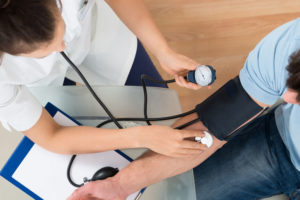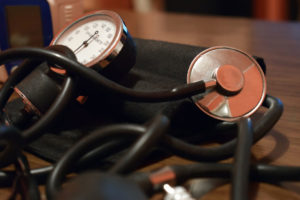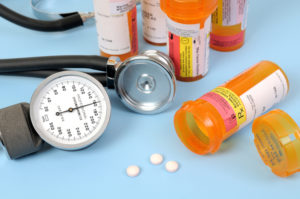Has your family medicine provider told that your blood pressure is too high? Maybe you’re already taking blood pressure medication. You’re not alone. Hypertension, or high blood pressure, is one of the most common chronic illnesses in the world. Uncontrolled blood pressure can cause a number of additional health problems, including heart disease, kidney disease, circulation problems, vision problems, and stroke. Unfortunately, high blood pressure often goes unnoticed because there usually are no symptoms, so it’s important that you know what you can do to keep your blood pressure normal. Here are some important tips on how you can deal with high blood pressure at home.
What is High Blood Pressure?
Blood pressure is actually the amount of pressure inside of your arteries, which are the blood vessels that carry blood filled with oxygen to the rest of your body. The top number, or systolic pressure, is the pressure produced when the heart contracts. The bottom number, or diastolic pressure, is the pressure in your arteries in between contractions. Both numbers are important. The goal is to keep the systolic pressure below 140, and the diastolic pressure below 90. Pressures higher than this that go untreated cause damage to the heart, arteries and organs, such as the kidney, eyes, or brain.
What are the Risk Factors of High Blood Pressure?
Some causes of high blood pressure are genetic. Men have a higher incidence than women. African Americans are also at a higher risk. However, while family history increases your chances of having high blood pressure, lifestyle plays a big role. People that are overweight have poor dietary habits including a high sodium intake and those who don’t exercise regularly are more likely to develop high blood pressure.
How is High Blood Pressure Treated?
If you have hypertension, it is important that you work closely with your health care provider to keep your blood pressure controlled. You may be prescribed one or more medications to help lower your blood pressure. It is very important to take the medications as directed, near the same time every day. Get into a routine and stick to it. You should also buy a home monitor, check you blood pressure and even keep a log that you can bring to your next appointment. However, just as important as taking your medications, there are changes that you can make to your lifestyle that can help control your blood pressure:
Low Sodium Diets
Sodium is found in most foods, and it plays an important role in controlling the fluid balance in your body. It is also the main ingredient of table salt. If you eat too much sodium, you will start retaining fluid. The extra fluid increases the pressure within your arteries, resulting in an increase in blood pressure. There are a number of things you can do to lower the amount of sodium you take in every day.
- Don’t use a saltshaker and don’t add salt when you’re cooking.
- Try experimenting with other spices, but check the ingredients because they may have added salt.
- Use lemon instead of salt.
- Use fresh foods; canned, boxed, frozen and processed foods have more sodium.
- Avoid foods high in sodium such as olives, soy sauce, Chinese food, bacon and bottled condiments.
- Beware of chips and pretzels, cold cuts, pizza, poultry injected with sodium solutions, soups and sandwiches
- Read food labels. Low sodium is 140 mg or less and no sodium is 5 mg or less per serving.
- When dining out, ask for no salt, no spices and no sauces.
Healthy Diet/Healthy Weight
Body Mass Index (BMI) is a measurement of body fat based on height and weight. The ideal BMI for both men and women is between 20 and 25. By following a healthy diet you will not only maintain your ideal BMI; you will also have a positive effect on your blood pressure and decrease your consumption of the high fat foods that are bad for your heart and cardiovascular system. Here are some basic dietary guidelines to keep you on the road to good health.
- Reduce your alcohol intake to two or fewer drinks per day.
- Eat more fruits and vegetables.
- Eat more fish and more low fat animal proteins (but watch the sodium content).
- Consume the recommended daily amount of fiber, which is 20 to 35 grams per day.
- Reduce the amount of caffeine you consume. Limit coffee to less than 2 cups per day.
Exercise
Daily exercise will help to lower your blood pressure. It is recommended that you exercise 30 minutes per day, most days per week. Walking is an ideal form of exercise, but you must continue a regular routine. Stopping routine exercise will cause your blood pressure to rise again. If you are not exercising regularly now, you should follow the rule of “start low and go slow.” Start with 15, or even 10 minutes per day. Increase just a little every day, until you reach 30 minutes.
Avoid some Medications
Some prescription and over-the-counter medications can increase your blood pressure. Nonsteroidal anti-inflammatory medications (NSAIDs), such as ibuprofen or naproxen, are readily available at your local store, yet they can cause an increase in blood pressure. Other medications to avoid are nasal decongestants, weight loss products, and illicit drugs. Some women will experience an increase in blood pressure while taking oral contraceptives. It is advised to talk to your family medicine provider before taking any of these medications if you have high blood pressure.
Signs that You Should Seek Emergency Care
Even with careful adherence to your medication and lifestyle plan, there are times when you blood pressure may be high enough for you to go to the emergency room, or to call 911. If you experience any of the following symptoms with a blood pressure of 180/110 or higher, please seek immediate help:
- Chest pain
- Shortness of breath
- Numbness or weakness
- Change in vision
- Difficulty speaking
- Severe headache
Remember that high blood pressure often occurs with no symptoms. That is why it is important to have regular checkups with your healthcare provider. Once you know that you have hypertension, it is important to talk to your family medicine provider about your plan, and follow the recommendations. High blood pressure is a chronic illness, and chances are that you will have to continue to take your medication and adjust your lifestyle for the rest of your life, so don’t ever stop taking your medications without consulting your family medicine provider. But remember, there are a lot of things that you can do at home to keep your blood pressure under control.
To learn more about high blood pressure, its treatment, and what you can do to keep yours controlled, call Advanced Medical PA at (561) 434-1935 to request an appointment, or request one online.




